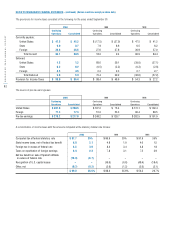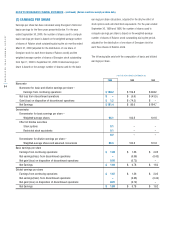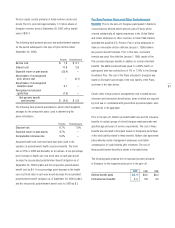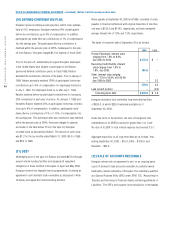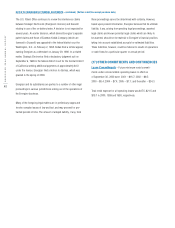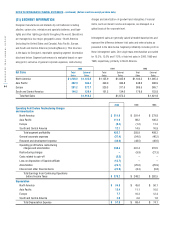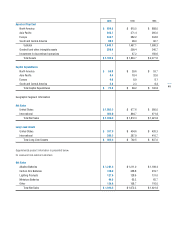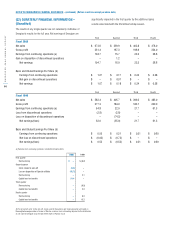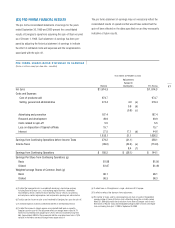Energizer 2000 Annual Report Download - page 42
Download and view the complete annual report
Please find page 42 of the 2000 Energizer annual report below. You can navigate through the pages in the report by either clicking on the pages listed below, or by using the keyword search tool below to find specific information within the annual report.
ENERGIZER 2000 ANNUAL REPORT
40
(15) FINANCIAL INSTRUMENTS AND RISK
MANAGEMENT
Foreign Currency Contracts
– Energizer enters into foreign
exchange forward contracts and, to a lesser extent, purchases options
and enters into zero-cost option collars to mitigate potential losses
in earnings or cash flows on foreign currency transactions. Foreign
currency exposures are primarily related to anticipated intercompany
purchase transactions and intercompany borrowings. Other foreign
currency transactions to which Energizer is exposed include external
purchase transactions and intercompany receivables, dividends
and service fees.
The table below summarizes, by instrument and by major currency,
the contractual amounts of Energizer’s forward exchange contracts
and purchased currency options in U.S. dollar equivalents at
year-end. These contractual amounts represent transaction volume
outstanding and do not represent the amount of Energizer’s exposure
to credit or market loss. Foreign currency contracts are generally for
one year or less.
2000 1999
Instrument
Forwards $ 122.5 $ 133.4
Options 25.0 17.7
Currency
Swiss franc 117.2 124.2
Canadian dollar 25.0 17.7
Other currencies 5.3 9.2
Concentration of Credit Risk
– The counterparties to foreign
currency contracts consist of a number of major international
financial institutions and are generally institutions with which
Energizer maintains lines of credit. Energizer does not enter into
foreign exchange contracts through brokers nor does it trade foreign
exchange contracts on any other exchange or over-the-counter
markets. Risk of currency positions and market-to-market valuation
of positions are strictly monitored at all times.
Energizer continually monitors positions with, and credit ratings of,
counterparties both internally and by using outside rating agencies.
Energizer has implemented policies which limit the amount of agree-
ments it enters into with any one party. While nonperformance by
these counterparties exposes Energizer to potential credit losses,
such losses are not anticipated due to the control features mentioned.
Energizer sells to a large number of customers primarily in the
retail trade, including those in mass merchandising, drugstore,
supermarket and other channels of distribution throughout the
world. Energizer performs ongoing evaluations of its customers’
financial condition and creditworthiness, but does not generally
require collateral. While the competitiveness of the retail industry
presents an inherent uncertainty, Energizer does not believe a
significant risk of loss from a concentration of credit risk exists with
respect to accounts receivable.
Fair Value of Financial Instruments
– Energizer’s financial
instruments include cash and cash equivalents, short-term and
long-term debt, foreign currency contracts and interest rate swap
agreements. Due to the nature of cash and cash equivalents and
short-term borrowings, including notes payable, carrying amounts
on the balance sheet approximate fair value.
At September 30, 2000, the fair market value of long-term debt
was $371.9 compared to its carrying value of $370.0. The fair
value of the long-term debt is estimated using yields obtained
from independent pricing sources for similar types of borrowing
arrangements. As of September 30, 1999, Energizer’s long-term
debt represented borrowings in foreign countries under various
credit facilities that provided for periodic interest rate resets, at
least annually. Therefore, the fair market value of Energizer’s
long-term debt was deemed to approximate its book value at
September 30, 1999.
The fair value of foreign currency contracts is the amount that
Energizer would receive or pay to terminate the contracts, consider-
ing first, quoted market prices of comparable agreements, or in
the absence of quoted market prices, such factors as interest rates,
currency exchange rates and remaining maturities. Based on these
considerations, Energizer would be required to make a total net
NOTES TO CONSOLIDATED FINANCIAL STATEMENTS – (continued) (Dollars in millions except per share data)




